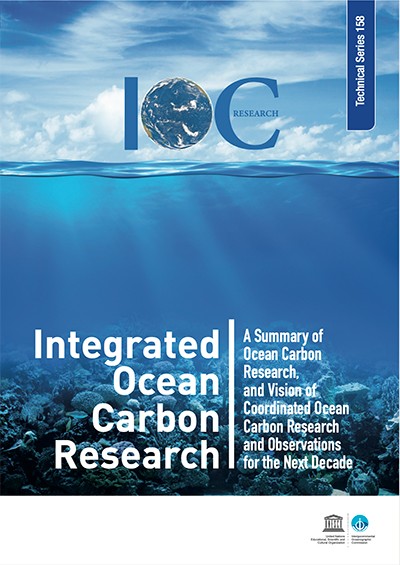A Summary of Ocean Carbon Research, and Vision of Coordinated Ocean Carbon Research and Observations for the Next Decade
IOC-R. 2021. Integrated Ocean Carbon Research: A Summary of Ocean Carbon Research, and Vision of Coordinated Ocean Carbon Research and Observations for the Next Decade. R. Wanninkhof, C. Sabine and S. Aricò (eds.). Paris, UNESCO. 46 pp. (IOC Technical Series, 158.) doi:10.25607/h0gj-pq41
Introduction: Knowledge of the ocean carbon cycle is critical in light of its role in sequestering CO2 from the atmosphere and for meeting goals and targets such as the UN Framework Convention on Climate Change (UNFCCC) Paris Agreement, the UN 2030 Agenda for Sustainable Development, and the associated UN Decade of Ocean Science for Sustainable Development. Increasing levels of CO2 in the ocean, predominantly due to human greenhouse gas emissions, and the partitioning of CO2 into organic and inorganic species have fundamental impacts on ocean carbon cycling and ecosystem health. The Integrated Ocean Carbon Research (IOC-R) effort aims to address key issues in ocean carbon research through investigative and observational goals. It takes advantage of the appreciable knowledge gained from studies over the last four decades of the ocean carbon cycle and its perturbations. IOC-R addresses the clear and urgent need to better understand and quantify the ocean carbon cycle in an integrative fashion in light of the rapid changes that are currently occurring and will occur in the near future. IOC-R can make significant breakthroughs, capitalizing on advances in modeling, data assimilation, remote sensing, and new in situ observing technologies, including novel biological observing techniques, artificial intelligence, and the use of bioinformatics. This IOC-R vision reflects an increasing appreciation for the significant role the ocean carbon cycle has on global well-being now and in the future, and for the critical need to study and monitor it in a holistic fashion.
The report was developed as part of the ongoing UN Decade of Ocean Sciences for Sustainable Development (2021-2030).
